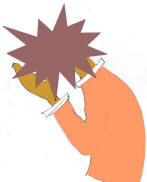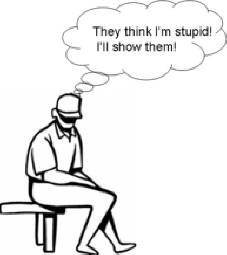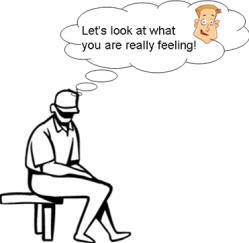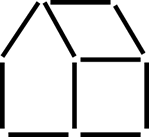GEAR UP FOR LIFE
PERSONAL
DEVELOPMENT
READING:
Anger
IN THIS UNIT:
Reading Passage and Practice: Managing Anger
Math: Interpret statistics using percentages and fractions
Vocabulary: Emotional terms
Writing: Complete sentences using "comma" words
Project: Penny project
Game: Cryptogram

Has your anger caused you to do things you didn't want to do?
Has someone else's anger frightened you?
SUPPORT ACTIVITIES IN
READING | WRITING |
MATH |
PROJECT |
FUN
Anger is an emotional reaction to an event or situation. It is a natural reaction, but it must be managed. You are the only one who can manage your anger.

To most people, anger is the enemy. It encourages hurtful and destructive actions. But if you learn about your anger, it can become your friend. It can show you how to become your own best friend.
Generally, anger is the result of frustration or low self-esteem. We get frustrated when we don't get what we want. We feel useless sometimes when we think that others don't respect or care for us. The result is anger.

Sometimes, anger turns against the person feeling it. You get mad at yourself. In that case, anger becomes depression, which can be very serious and dangerous.
Most often, people get angry because of how they think, not because of what someone did. If you think someone disrespected you, and if you think that matters, you will get angry. When you give up that kind of thinking, you stop getting angry.
Always ask yourself, "Am I absolutely sure that he attacked me, or that she meant to hurt me?" Next, ask yourself, "Is it important what he or she thinks?" " Am I more peaceful if I don't take that thought any farther?"

If you don't guide your anger back to peace, it will control you. Who wants to be controlled by such a destructive emotion? How would you feel if you didn't have that anger to deal with?
You can take a very important first step to start getting rid of your anger. Decide that you don't want it to control you anymore! You want to be in charge. You recognize that anger is a weak and defensive reaction to events. There is nothing to admire about it. Which do you admire the most, someone who is confident enough not to argue, or someone who flies off the handle all of the time?
When you sense that you are getting angry, learn to make anger your friend. First, ask, "What is causing this reaction in me? What is my anger telling me? Am I needing approval? Am I reacting out of habit? Am I just acting like someone else in my family? Is this an issue now or from my past?" In other words, start finding your "buttons." Learn what buttons other people push to make you angry. Look at them straight on. You might even laugh.

Second, decide what to do next. Are you going to let anger tell you what to do? Can you decide to let things go? Try it once or twice and check how it feels. How does it feel to be in charge? The more you make a decision and follow it, the better you will feel about yourself. Anger can help you become your own best friend if your thinking is right.
Finally, remember that certain situations make it harder for you to control your anger:
- Physical fatigue
- Pain
- Alcohol and other drugs
- Other stresses in your life
When you know you are tired, hurting, under the influence of drugs, or under stress, remember to raise a big flag. Make a decision that when you are not feeling right, you will not allow yourself to get into arguments or violent situations. As they say, "Just say NO!"
Brain Gym
You were probably told not to play with matches. But if you are
careful, you can use matches to build this figure of a house.
Challenge: Take ten sticks (matches or toothpicks) and "build the house you see below. Now, move one stick and add one other to create two new matching houses.
If you give up after many tries, click on the house for the answer.
SUPPORT ACTIVITIES IN
READING | WRITING |
MATH |
PROJECT |
FUN
All rights reserved
© Leecy Wise and Vicky Lara
